3 Questions Everyone Should Ask Themselves Before Becoming a Plant Parent

If you opened this story, chances are you’ve at least considered becoming a plant parent. Honestly, what’s there to think about? After all, 2018 is all about that plant life. Not convinced? Just check out our Instagram account @iplanteven.
Not only are plants a great way to breathe some much-needed life into your home, many species can improve your space’s air quality. Pretty cool, huh?
But with great (flower) power comes great responsibility.
Okay, being a plant parent isn’t as demanding as, say, being a real parent; however, it does require same research and tender, loving care.
“There’s diversity in plants, and the environments that they hail from, [so] it’s important to find out what your plants like, so you can give them what they need and be set up for success,” says Christopher Satch, the Sill‘s resident plant scientist. “You wouldn’t buy a cat or a dog without doing a bit of research, so why would you buy a plant without research? ”
As dramatic as it sounds, choosing the wrong plant for your home will ultimately result in your leafy greens drying up and deteriorating.
Don’t panic, plant rookies. To help, Satch shared three questions everyone should ask themselves before becoming a plant parent.
1. “Do I have enough light for this plant?”
Never underestimate the power of good lighting—especially when it comes to your plants.
“Light is food for plants, and without enough light, they will starve,” Satch explains. “All of your plants will want to be in a window. Not near it; in it.”
We know what you’re thinking: “But what about those plants marked as low light?” Yes, they still need some precious light.
“People often misinterpret plants marked as low light as that they ‘thrive’ or ‘like’ low light,” Satch explains. “Really, the plant tolerates low light. No plant likes low light, much like no one likes being on a diet.”
He also says many people think their home is brighter than it really is, which won’t do your plants any favors. Fortunately, you can easily—and accurately—evaluate your room’s brightness with your smartphone.
“Open and unfocus your phone camera,” he recommends. “You should see everything as quite dark. If you focus on the window, you will see the rest of the room turn almost black. With all that darkness, it’s a good idea to place your plants in a window, or as close as possible to a window.”
2. “How often can I care for my plant?”
Sure, you’re not schlepping your plants to soccer practice or helping them with their homework, but being a plant parent does require some time and effort. Before you head to the nursery, think about how much time you can realistically commit to caring for your greenery.
“Plants are living things, and some are needier than others,” Satch explains.
Love a perfect night in? Air plants, ferns, and orchids require a daily spritzing or weekly soak, making them ideal for self-proclaimed homebodies.
Alternatively, busy bees and jetsetters should stick to cacti and succulents.
“We affectionately call [them] the ‘moody teenagers’ of the plant world,” explains Satch. “Mostly leave them be, but occasionally check up on them to make sure they’re fine—like the true plant parent you are!”
3. “What do I want out of this plant?”
ICYMI: Plants are a lot more than Instagram bait. Truth is, many types of plants have special benefits that can make your home a happier, healthier place. Before you take the plunge, make sure you’re buying your greens for the right reasons.
“A plant is a living thing, and should be about more than just looks,” Satch says.
Do you want to grow some spices and herbs indoors? Improve your space’s air circulation? Add some fun flowers to your home? Anything’s possible, but make sure you do your research beforehand.